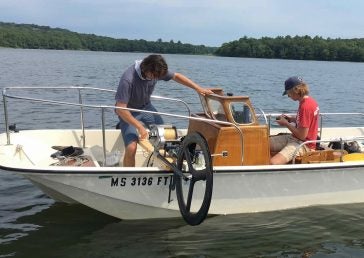
By Neil Nachbar
Brennan Phillips is always looking to push the envelope when it comes to deep-sea technology.
In the past year, Phillips, an assistant professor of ocean engineering at the University of Rhode Island, created the most compact deep-sea system in the world that can provide a livestream video feed. His fiber optic reel system (FOReelS) is described in the March 2021 issue of the journal Sensors.
Now, Phillips will test the limits of his system, thanks to a three-year, $510,000 Young Investigator Award he received from the Office of Naval Research.
“My team and I will focus on increasing the operational capabilities of the system so that it can be used on autonomous platforms,” said Phillips. “We’ll investigate deep-sea, size-optimized payload options that can be used with the system, such as a remotely operated vehicle or a sensor array. We’ll also integrate a distributed temperature sensing system, which will allow us to observe and measure deep-sea temperatures along the length of the fiber optic fishing line.”
Phillips and Christopher Roman, URI professor of ocean engineering and oceanography, will be in Bermuda July 1-12 to conduct research for a project funded by the Naval Undersea Warfare Center in Newport, but they’ll also conduct experiments related to the Young Investigator Award.
“This research into state-of-the art, innovative fiber optic solutions will facilitate next-generation oceanographic sensing and deep-sea system solutions for the U.S. Navy and the scientific community,” said Phillips. “Compact reel-based deployment schemes may enable real-time high bandwidth data transmission and distributed sensing solutions over large underwater distances using autonomous surface vessels and unmanned aerial vehicles.”
Because the fiber optic reel system is so light and compact compared to previous systems, it can be used on smaller boats.
“We’ll be using a 45-foot Downeaster, which is essentially a converted lobster boat,” said Phillips. “Our operating costs will be significantly reduced compared to using a larger vessel.”
The highly competitive Young Investigator Program provides awards to outstanding early-career scientists and academics based on their achievement and potential for scientific breakthroughs. Phillips is one of 38 academic scientists at 23 institutions to receive the honor in 2021.
Ashutosh Giri, assistant professor of mechanical engineering at URI, also received a Young Investigator award for “Unraveling the Microscopic Dynamics of Coupled Energy States in Nanostructures.”
